Written By: Menachem Rephun, Communications Manager and Self Advocate
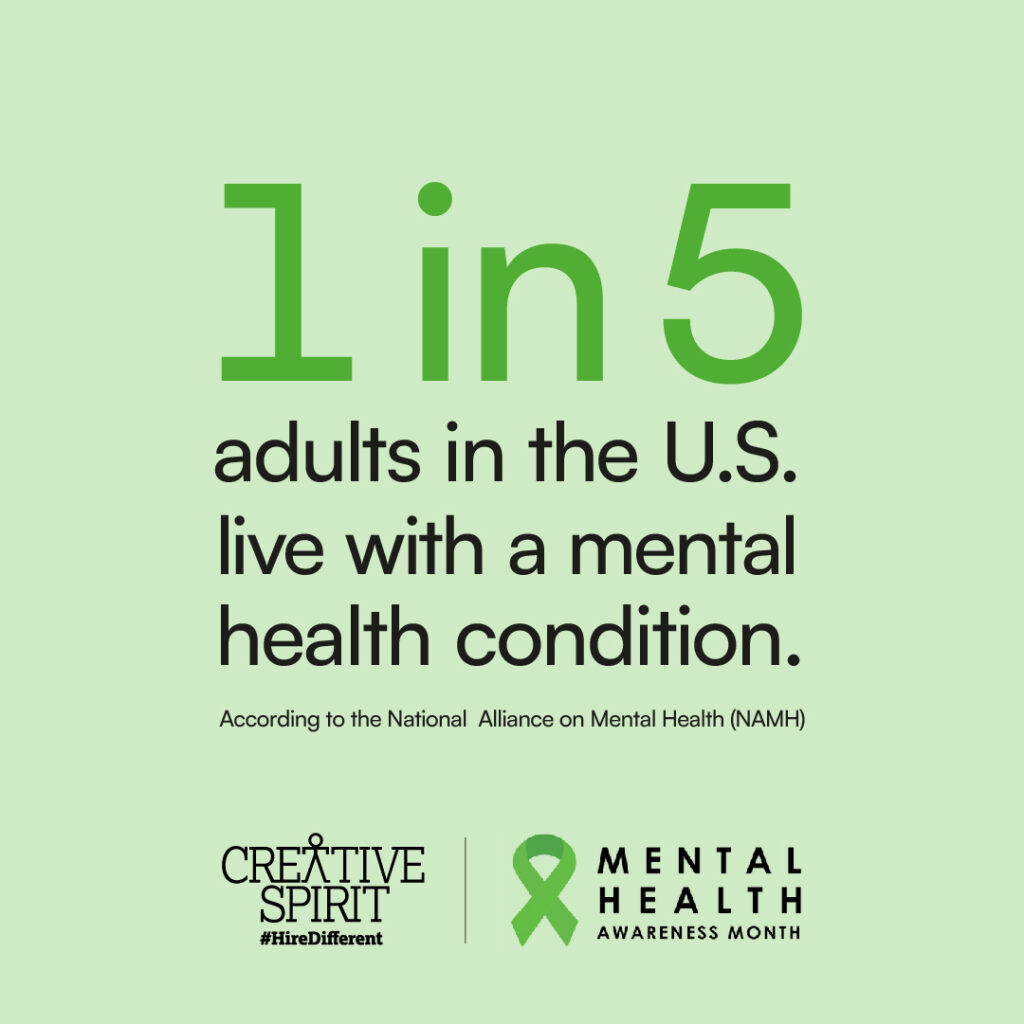
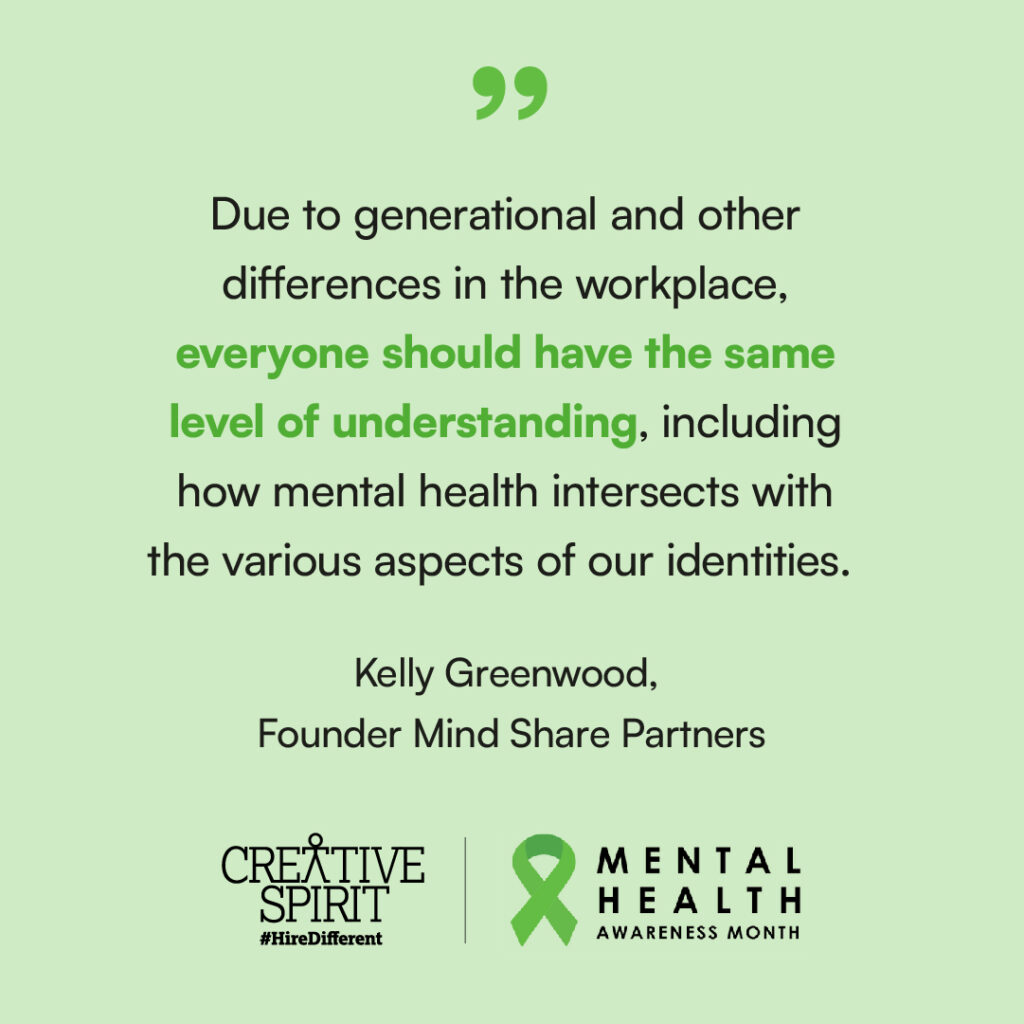
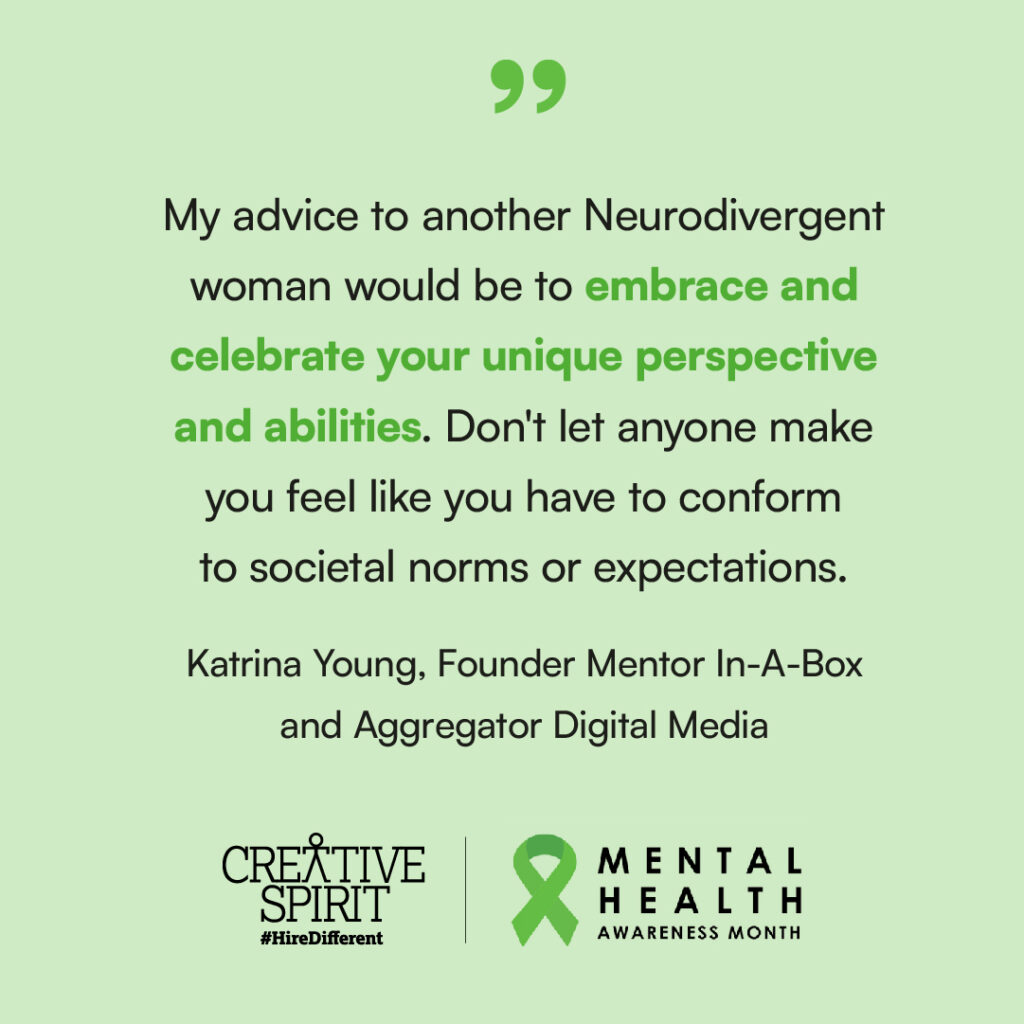
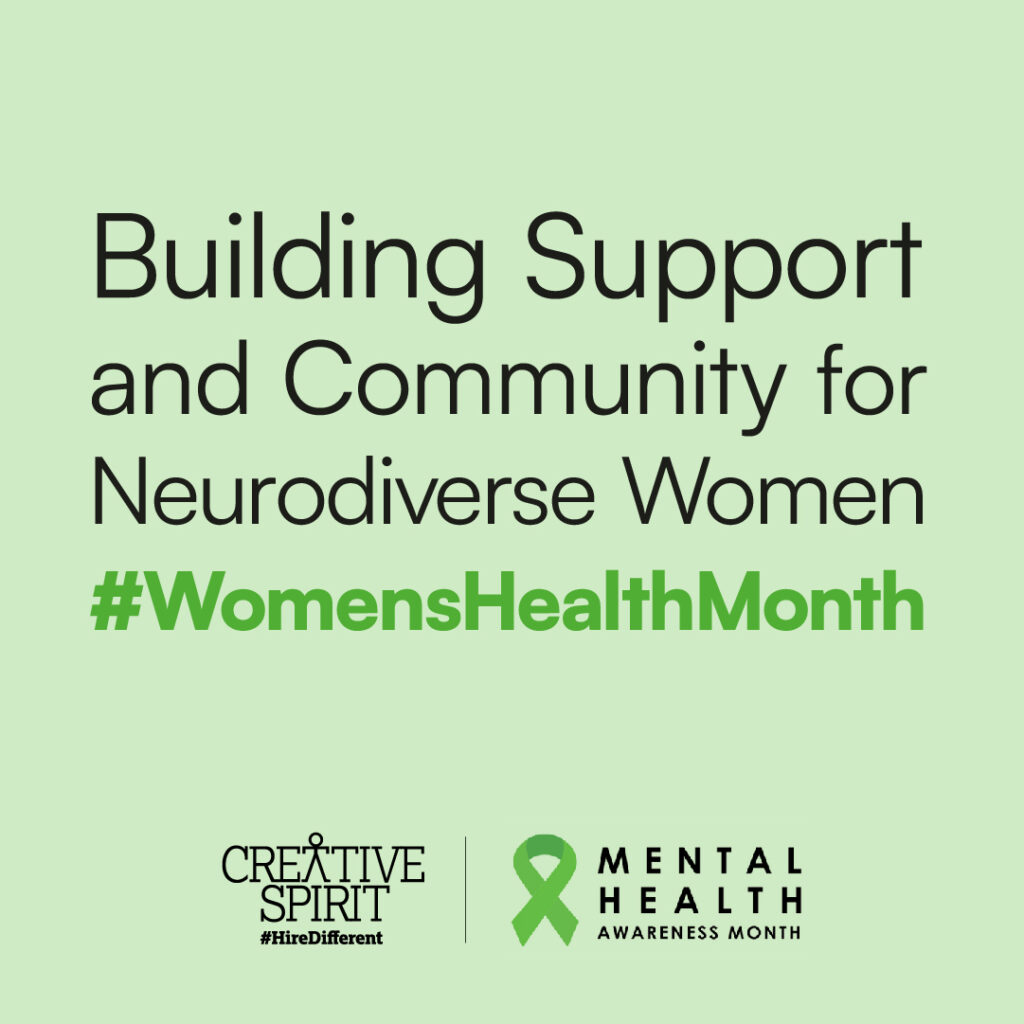
Overview
Nearly 1 in 5 adults in the U.S., or roughly 10 million people, live with mental health conditions, according to the National Alliance on Mental Health (NAMH). Yet access to mental health services in the U.S. is severely restricted for many, despite 56% seeking help, according to the nonprofit organization Cohen Veterans Network. Since 1949, Mental Health Awareness Month (MHAM) has been celebrated annually to advance mental health awareness and connect individuals with the vital resources and information they need. This year, Mental Health Awareness Month overlaps with Women’s Health Month, which is a time to focus on building community support and inclusion for the millions of neurodiverse women, and all women, in the workplace, and developing practical strategies and solutions that can make a lasting difference for millions of Americans who are neurodiverse.
Building that community and support system is crucial given that many women, including those who are neurodiverse, face challenges such as juggling work with parental leave; maintaining office housekeeping roles; and anxiety about whether or not to disclose a mental health condition. As Kelly Greenwood writes in an essay for Harvard Business Review, “The structures and systems of most companies were built with men in mind.” Greenwood also points out that “Many women may not be inclined to “other” themselves further by disclosing a mental health challenge.” Greenwood describes her own experience “covering”, or hiding, disability, to better fit in with male-dominated workplaces, something she’s found necessary even in her current role as CEO and founder of the workplace mental health nonprofit Mind Share Partners. Greenwood points out that there are many avenues for women to advocate for mental health in the workplace, including being outspoken in identifying and asking for what they need, finding allies and safe spaces, speaking with managers and HR, and evaluating whether their workplace culture is fully supportive. Greenwood also encourages women to reflect on the nature of their specific mental health challenge, i.e., whether it’s chronic, episodic, or a one-time event, and whether the challenge is work-related or limited to their personal life. “Talk with a friend, family member, or therapist about your concerns and brainstorm the potential asks that you could make at work to support yourself,” she suggests. “You may also want to get advice from a women’s circle or ask female friends to recommend therapists, books, or podcasts that focus on gender.” Greenwood cites a Deloitte study which found that women who work for gender-inclusive organizations have better mental well-being and stronger company loyalty. She also points out that, as younger generations are prioritizing mental health and work cultures that support it, companies hoping to compete for talent will have to adapt accordingly. The boost to productivity and growth from workplaces that support mental health gives businesses a strong incentive to pursue this. Forming employee resource groups (ERG) is also an important step in supporting mental health in the workplace. As Harvard Business Review explains, ERGs help to break down mental health stigmas and “can reach people impacted by mental health who might not be willing to join a group as a result of the stigma.”
Empowering Employment – Advice From Neurodivergent Advocates
Studies and research have also shown a positive link between gainful employment and mental health. For example, data from the World Health Organization (WHO) shows that work supports mental health by providing a livelihood, a sense of confidence, purpose, and achievement, supporting positive relationships and community inclusion, and offering a platform for structured routines. Greenwood believes business leaders, managers, and HR professionals can be a force for change and contribute to supporting mental health for women in the workplace by offering mental health training for people at all levels, including executive teams, managers, and individual contributors. “Due to generational and other differences in the workplace, everyone should have the same level of understanding, including how mental health intersects with the various aspects of our identities,” she writes, “gender and otherwise,” Greenwood recommends that leaders communicate about mental health benefits in company-wide emails on at least a monthly basis, and that leaders should share if they’ve used those benefits personally, to help destigmatize mental health conditions. “Authentic leadership is an extremely effective, evidence-based way to gain trust and lessen stigma,” Greenwood writes. “Being vulnerable and sharing about your own mental health or other challenges is one of the most powerful things you can do. It signals to employees that they can discuss what was once taboo in the workplace and helps them feel comfortable sharing.”
Protecting Mental Health In Workspaces
Protecting mental health is extremely important due to the vital role women play in the workforce. As Its America.org points out, women account for nearly half the workforce in the United States, as well as the largest pool of untapped talent that will be vital in filling management and leadership roles vacated by the baby boomer generation in the near future. Women’s Health Month spotlights the many women, including those who are neurodivergent, who strongly advocate for mental health awareness and workplace inclusion for women. These include Dayna Ellen Halliwell, Content Creator and Strategist at Purple Goat Agency; Katrina Young, a strategic business venture consultant and digital marketing specialist named as one of the top 40 Digital U.K. Women to Watch; TV Producer, Filmmaker, Presenter, and Author Talisha Johnson; and many others. “As a neurodivergent woman myself,” Young has said, “I understand the unique challenges and obstacles that come with navigating life in a world that may not always be accommodating to our differences. My advice to another Neurodivergent woman would be to embrace and celebrate your unique perspective and abilities. Don’t let anyone make you feel like you have to conform to societal norms or expectations.” Talisha Johnson has also offered advice for neurodivergent women navigating their careers and life in general. “My advice is to do at least one thing a day that makes you happy,” Johnson has said, according to WomenBeyondtheBox.com. “From my own personal experience as a woman who is Autistic, a lot of energy can be spent on masking and code-switching to make others around me comfortable. However, taking the time to discover and appreciate what brings you joy is a necessary reminder that it’s impossible to solely live for others whilst neglecting your own wellbeing. It’s important to look after number one.” Creative Spirit Community Manager Joanna McElnea also shared her perspective. “A lot of times I see women talking about their difficulties before their accomplishments,” she said, “and I would love to see more women just talking about their accomplishments and coming together to celebrate their uniqueness and important perspectives.”
The Importance of Neurodivergent Individuality
Another staunch advocate of inclusion of neurodiverse women in the workplace is Toni Horn, a Neurodiversity Consultant and founder of Think Differently Coaching. In an interview with Peoplexcd.com, Horn stresses the importance of recognizing the individuality of all neurodivergent people, and the fact that no two neurodivergent people are the same. Horn also explains why offering accommodations to employees who disclose their neurodiversity is so important. “There is proven evidence that by giving someone the right tool to do their job their productivity increases,” Horn said. “Workplace adjustments can provide support through training and coaching as well as assistive technology, which can be done through access to work.” Horn points out that many neurodiverse employees, including women, are afraid to disclose their neurodiversity due to past experiences with discrimination, or knowing others who have been discriminated against. As a result, both self-esteem and workplace productivity are negatively impacted. “All these factors [i.e. stigma and discrimination] contribute to self-esteem and how one feels about the culture they’re working in,” Horn explains. “You need to challenge the stigma and the culture and make sure that psychological safety is the first part of introducing neurodiversity into the workplace.” Mental Health Awareness Month and Women’s Health Month are instrumental in challenging and overcoming that stigma, driving home why creating and enabling change in the workplace is so important, and raising awareness of how beneficial neurodiverse inclusive workplaces are for everyone from both an ethical and economic standpoint. “The average person will spend over 84,365 hours at work in their entire lifetime,” Horn writes, “during which they deserve to feel safe, supported, respected, and empowered. There is no quick fix to change what can be an unwelcoming mainstream work culture for neurodiverse women. Effort needs to be made across the board in all aspects of your business, and it is key that neurodiverse women have a seat at the table for discussing and implementing these changes.” Mental Health Awareness Month and Women Health’s Month can inspire both business leaders and self-advocates to redouble that effort, raising awareness of the importance of inclusion for neurodiverse women, and all women, in the workplace, and making that inclusion happen by ending stigma, creating a viable support network, empowering neurodiverse women in leadership roles, and providing reasonable accommodations for employees to succeed.
Sources:
- https://www.defeatsuicide.com/post/new-study-reveals-lack-of-access-as-root-cause-for-mental-health-crisis-in-america
- https://hbr.org/2022/03/how-organizations-can-support-womens-mental-health-at-work
- https://www.cam.ac.uk/research/news/autistic-adults-have-a-higher-rate-of-physical-health-conditions
- https://www.additudemag.com/adhd-women-comorbid-conditions/
- https://www.who.int/news-room/fact-sheets/detail/mental-health-at-work
- https://www.womenbeyondthebox.com/50-influencers-2023/
- https://www.peoplexcd.com/insights/long-read-how-to-support-and-empower-neurodiverse-women-in-the-workplace/
- https://itsa.org/why-we-need-women-in-the-workforce/#:~:text=Why%20do%20we%20 even%20need,valuable%20and%20should%20be%20 revered.

